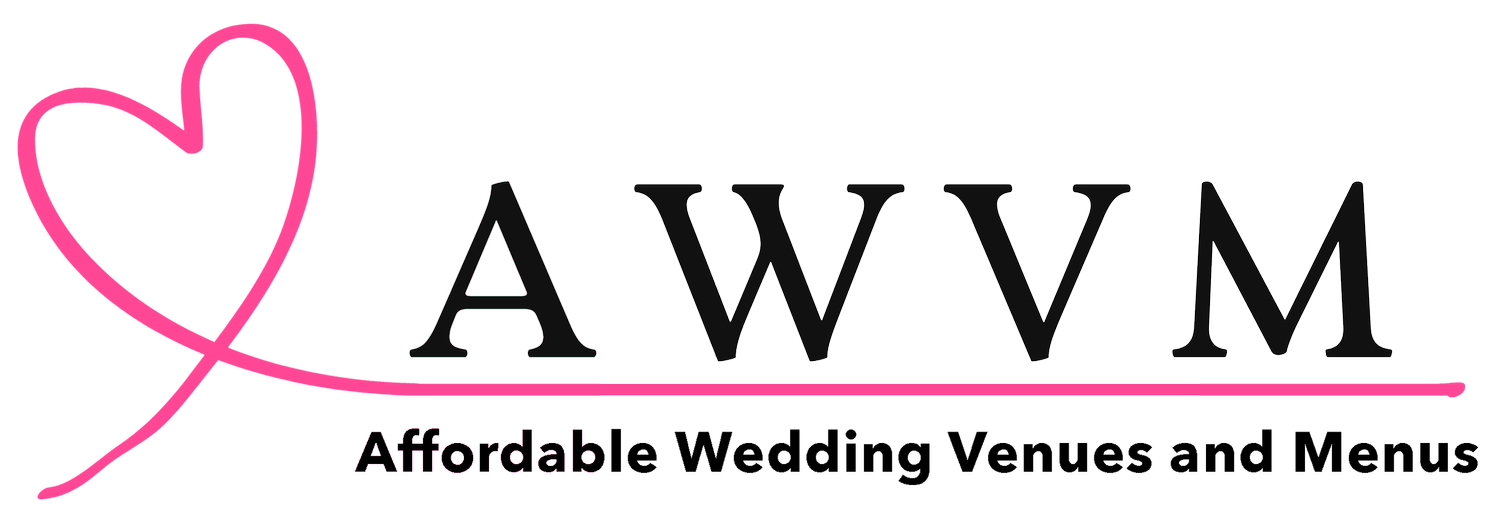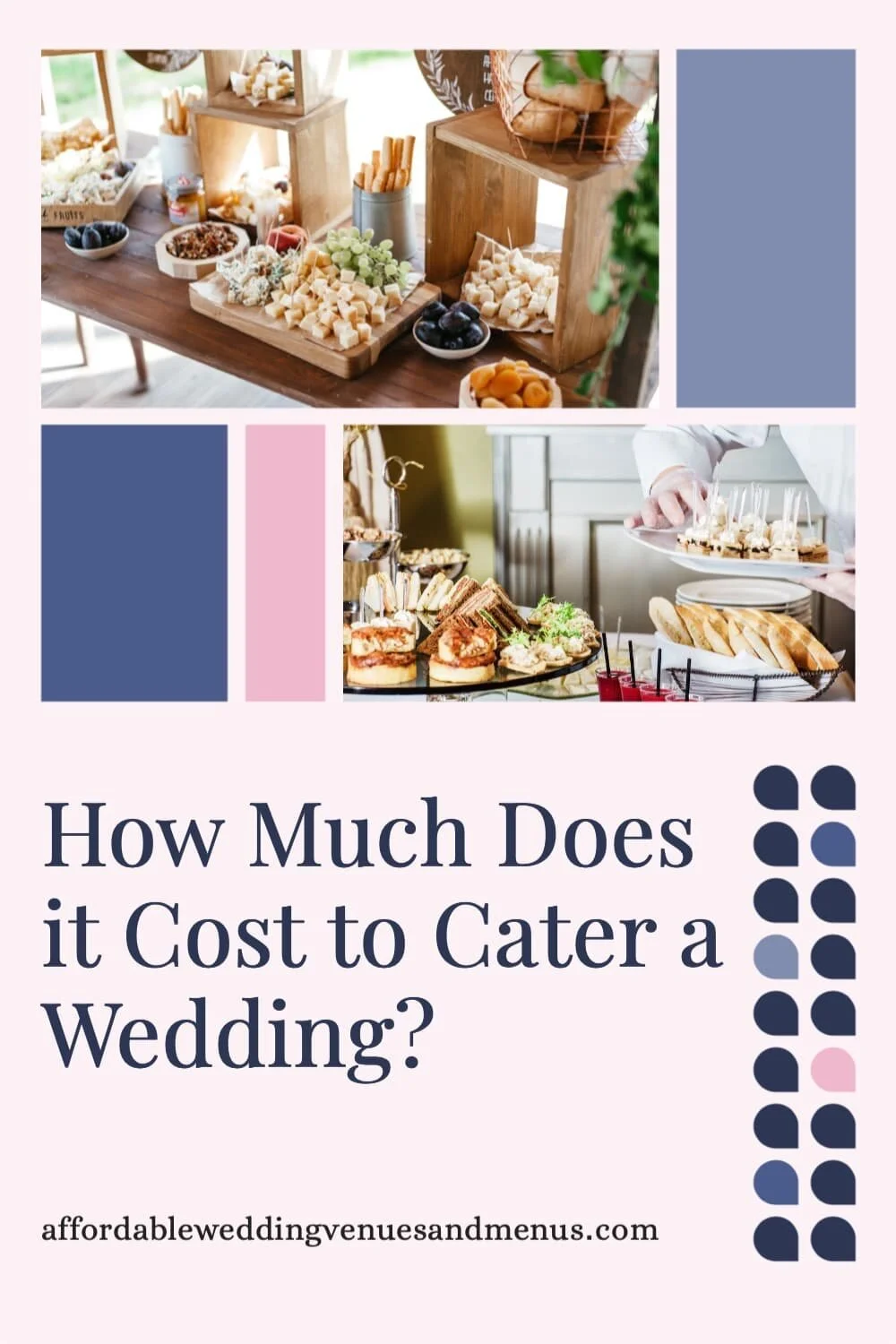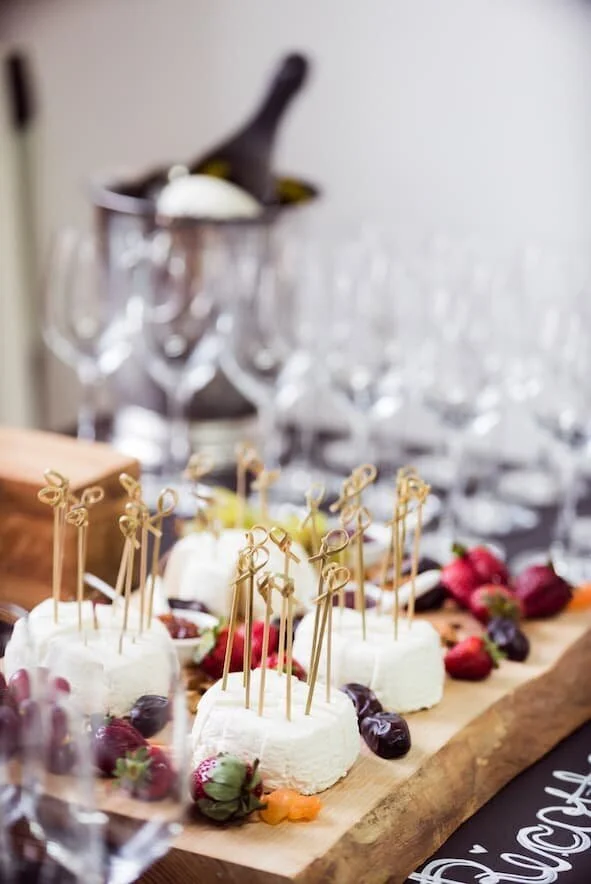How Much Does it Cost to Cater a Wedding?
Maybe you’ve already set your wedding budget. Or maybe you’re still trying to figure it out. Either way, it’s important to get a handle on your catering costs right away.
Typically, food and drinks at your wedding reception account for 50% of your entire budget. If you work out your catering costs first, you’ll be able to build a reasonable budget around that price. But how much does it cost to cater a wedding?
Below, we’ve detailed the typical costs of wedding catering, what wedding catering includes, tips on saving money on wedding catering, a guide on how to select a caterer, and more!
What Does Wedding Catering Include?
Wedding catering includes all the food and drinks served at your wedding. When you choose your caterer, they’ll offer you a choice of packages at a range of prices. As well as the food, your package will include all the service and chores around serving your meal.
The caterers will usually:
Set up your tables, linens and dishes
Serve the food and beverages
Keep buffet tables clean and stocked
Cut and serve your wedding cake
Clear off tables
Clean up the kitchen
If you’re serving alcohol, the bartender will have a certification
What is the Average Cost Per Person for Catering a Wedding?
The average cost of wedding catering depends on where you live. Some cities are more expensive than others. If you live in a smaller town with a lower cost of living, you’ll be able to find caterers with lower prices. If you live in a bigger city, like New York or San Francisco, expect to pay a lot more.
A low price for a catered meal would be $10 to $15 per person. At that price, you could get breakfast, brunch, or lunch. Or a casual type barbecue or buffet dinner.
Medium prices are usually $20 to $75 per person for a traditional wedding dinner. Banquet halls or upscale caterers often charge $80 per person and higher.
As well as the meal, you’ll also need to pay for drinks for your guests. The most expensive option is a full bar. Your caterer will offer you a bar package on top of your meal package. Their prices can start at $18 per person, or they can run high - some will be $30 or more per person, depending on your location and the venue.
Types of Wedding Reception Food Service Styles
Several wedding guests raising their glasses at a reception table. Image by Al Elmes.
Plated
Also known as a sit-down service, a plated dinner means guests sit at their tables while waiters bring them their plates. You will need to have guests choose their dishes ahead of time so the caterer can prepare the correct amount of food
Pros:
Plated service creates a fine dining atmosphere and allows you to control the menu and portion sizes. This ensures everyone gets fed.
Cons:
Sit-down dining limits your guests, so they must stop dancing or mingling to eat. Plus, if guests have dietary restrictions, this option can cause some to be unable to eat anything at all.
Buffet
Buffets are self-service food stations where your guests can pick and choose what they eat. They will get their own plates and beverages before sitting down to enjoy the food.
Pros:
Buffets are flexible and allow wedding guests to eat when they are ready to. It also offers an abundance of fresh options and ensures there is enough food to go around. Plus, they are extremely cost-effective, and you don’t need to take orders ahead of time!
Cons:
Buffets can get messy. Some guests may take more than their fair share of an item, and guests with food sensitivities may experience cross-contamination. There’s also the issue of food quality, as food sitting under lamps or overheated bases may dry out over time.
Family-style
Guests are served platters and bowls of food at their table or along one long table. Just like at a family dinner, guests will pass dishes and serve themselves. All of the food is placed at the table for all to access.
Pros:
Family-style service is extremely efficient, meaning food will get to your guests' plates very quickly. Additionally, you won’t need to have them preselect their meals, which takes the pressure off of you!
Cons:
You’ll need a lot of table space for family style, so this could be a challenge for larger guest lists. It also isn’t as economical as a buffet.
Cocktail-style
Also known as passed hors d'oeuvres, the cocktail style involves guests standing and taking food from various trays. These platters are either passed by waitstaff or placed around the room.
Pros:
This laidback style allows guests to mingle and nibble on whatever bites catch their eye. They can also take as much or as little as they want, as caterers often replenish these trays throughout the evening.
Cons:
Your guests may still expect a meal, especially if your reception occurs during a traditional meal time. You will have to specify on your invitation what kind of meal you are providing. Additionally, since these cocktail foods are smaller in size, your wedding guests may be left wanting more.
How Much Does it Cost to Feed 100 Wedding Guests?
The cost of feeding your wedding guests will depend on where you live and what type of meal you want to serve. Luckily, The Knot has gathered all the data and averaged it out for us.
The average cost for wedding catering is $9,170. Or $70 per person. Remember, though, this is a national average. Depending on where you live, you can probably find prices that are higher and prices that are lower.
What to Consider When Catering Wedding Food
A table full of red and blue drinking glasses. Image by Aniket Narula.
As you choose the right catering provider and food choices, there are lots of aspects you’ll need to consider.
You’ll need to know if any guests have dietary restrictions. Whether it’s food allergies or special diets, every guest will expect to have something to eat. Also, cultural foods are an important component of any celebration, so ask if your caterer is comfortable preparing these foods.
If you’re budget-conscious, remember that you’ll need to include tips for your catering staff in the overall cost of your catered meal. Additionally, pre and post-party foods may also be required, especially if you plan on gathering with your close loved ones after your wedding.
Bar Packages for Weddings
If you want to serve alcohol at your wedding reception, there are several options. An open bar means your guests have access to everything offered by the establishment, and you just pay the tab at the end of the night. A cash bar means guests pay for the alcohol they drink. A limited bar means you offer a few options to your guests.
When choosing alcohol packages, think about your overall budget. An open bar may be favored by wedding guests, but it will add quite a bit to your overall budget. You will need to include in your invitation that you are offering a cash bar so guests know to bring money with them.
If you want to manage alcohol costs at your wedding, consider offering a decorated signature cocktail or a limited champagne toast. Some venues allow you to bring your own alcohol, so you can purchase wine and beer in bulk and serve that. Of course, you can go alcohol-free and save a ton of money overall.
If you aren’t sure what package makes sense for your wedding, compare your options of a cash bar vs. host bar vs. an open bar.
Extras and Upgrades From Your Caterer
If you have room in your budget, you can have your caterer add on extras - from upgraded linens to extra bartenders.
Some popular add-ons are:
Cocktail hour
Midnight pizza
Late night burgers
Carving stations
Food stations
Dessert bars
Beverage stations
Food trucks
Reception table set with appetizers and wine glasses.
Catering Cost Breakdown
Your catering cost will be based on the food and beverage packages you choose. Once you choose your packages, most caterers will add on extra fees for extra services. When you start looking for your wedding caterer, you’ll need to ask how much they charge for each different catering fee. Here are some of the most common expenses and fees you can expect to pay a caterer:
Minimums
Most traditional caterers will ask for minimums for your wedding meal. That means they’ll require you to have either a certain number of guests or spend a certain amount of money. Most caterers ask for a minimum of 100 to 125 guests. Once you sign the contract, you’ve agreed to meet those minimum numbers.
Meal Package
Most wedding caterers offer meal packages at a range of different prices. You can choose your package based on your budget. The lowest price package will typically include a full meal with soup, salad, an entree, dessert, coffee, and tea. Higher priced packages will include the meal, plus a cocktail hour with passed hors d’oeuvres. If you’ve got a bigger budget, you can add on special packages, like upgraded meals or midnight snacks.
Bar Package
Like the meal package, your caterer will offer low to high-priced bar packages. The lower-priced packages will have generic alcohol with a smaller selection. Higher-priced packages will offer premium alcohol with more selections available. Overall, alcohol can make a significant impact on your wedding budget, so decide carefully.
Corkage Fee
You can save money at your wedding reception by bringing your own bottles of wine or champagne, but most caterers will charge a corkage fee. The fee covers their costs for bartenders, servers, glasses, and liability insurance. If you’re thinking about bringing your own alcohol, check with your caterer first to find out how much the corkage fee is. Typically, a corkage fee costs between $10 and $20 per bottle.
Slicing Fee
If you order your cake from an outside baker, your caterer will usually charge a slicing fee to serve it to your guests. The fee covers their costs for servers and extra dishes. Check with your caterer to find out how much the slicing fee is. Typically, a slicing fee costs between $1.50 and $3 per slice.
Gratuities
Most caterers add 20% to your bill for gratuities. If it’s not added automatically, you’ll probably want to tip your servers on your wedding day. Make sure you know ahead of time so you can be prepared.
Delivery Fees or Set-Up Fees
If your caterer is not an in-house vendor at your wedding venue, they may charge delivery fees or set-up fees for bringing the food to your wedding.
How Do You Calculate Wedding Catering Costs?
Caterer placing appetizers on a buffet table.
Your caterer should include a complete cost breakdown in your quote and your contract. If you don’t have one yet, you can figure out the costs by doing a bit of math. If you have some package prices, start with those, then add up all the extra fees.
Add Up the Meal and Bar Package Prices
The first number to look at is the price per person for the meal and bar packages. Multiply the meal package by your number of guests. Then multiply the bar package by your number of guests. Add them together to get a rough idea of the price.
When you’re adding up your guests, check if the caterer has special prices for children’s meals. And remember that you need to feed your vendors. Your photographer and DJ usually have it written into their contract that you’ll provide them with a meal. Ask your caterer if they offer vendor meals and what the prices are. Add any extra meals to your total.
Include Any Extra Fees
Your catering bill will end up costing more than just the package prices. Add up all these extra fees so you won’t be surprised when you get the total.
Corkage Fee: If you’re bringing your own wine, multiply the number of bottles by the Corkage Fee and add it to your total.
Slicing Fee: If you’re ordering your wedding cake from an outside baker, multiply your number of guests by Slicing the Fee and adding it to your total.
Gratuities: Gratuities should be calculated before tax. Add a 20% gratuity by multiplying your current total by 0.2.
Sales Tax: The last thing to remember is sales tax. Depending on where you live, it’ll add another 5 to 18% to your final bill. If you don’t know your local sales tax, multiply your total (before gratuities) by 0.1 to get a rough figure for now.
Tally All the Numbers
Ready for the final number? Add your total, plus your gratuities, plus your sales tax. Your final bill for your catering should be pretty close to that number.
When you do choose your caterer, make sure all these extra fees are included in your quote and contract. As well, check your contract for any fees that might not be included. Sometimes, caterers will charge extra fees for set up, delivery, clean up, or dish rentals. Make sure your contract lists what’s included, plus any extra charges.
How Can You Save Money on Wedding Catering?
A long wooden table setting with flowers and dinnerware.
Your wedding catering costs will depend on the time of year, the menu you choose, and your style of food service. There are several ways you can save money on your catering budget and land affordable wedding food, including:
Ask for Deals: Some caterers will offer special pricing in the wedding off-season. They also may have a unique menu for brides on a budget they can offer or less expensive in-season dishes.
Consider Your Wedding Reception Time: If you’re on a tight budget, think about having your wedding at an off-peak season, day, or time. For example, getting married on a weekday or in the afternoon will save you big bucks!
Choose Comfort Foods: As long as the food is hot and fresh, don’t worry if you can’t afford gourmet food. Stick with less expensive options, like chicken or pasta. Your guests will be happy to see familiar favorites!
Opt for Alternative Food Service Methods: Buffet-style food service is the least expensive option. If you choose a buffet, you can offer lots of delicious food at a great price. Plus, you won’t have to pay service fees for waitstaff and use of dishes. Buffet food displays can be elegant without a huge cost.
DIY a Grazing Table: Wedding charcuterie boards and grazing tables are all the rage because they are easy to assemble and very cost-effective. Consider making your own grazing table as an alternative for professional appetizers.
Design a Dessert Table: The wedding cake can be a huge expense, especially if you’re planning on serving the cake to all of your guests. Instead, purchase a smaller cake to cut for photos and design a stunning dessert table. You can serve more affordable options, like cupcakes, donuts, or even cookies!
Choosing Your Wedding Caterer
Choosing your caterer is one of the toughest decisions. Take your time and make sure you go through all the different options. Look for a caterer that offers a package at prices you can afford.
Once you find the right caterer for you, the rest of your wedding planning will be a lot simpler. You’ll have the actual prices, and you’ll be able to build the rest of your wedding budget. Once you’ve decided what to eat, you can move on to the easier decisions. Like what to wear…
When Should You Hire Your Caterer?
As soon as your date is set, you should start researching caterers. Ideally, you will want to secure one six to eight months before your big day. If you have a shorter planning timeline, you should get your caterer books as soon as possible.
Early planning is essential for getting the very best caterers. The more experienced the catering company, the more in demand they will be. You don’t want to be stuck with a caterer who is unfamiliar with the cuisine you want or with serving a wedding reception. So it’s best to research and book your wedding caterer as soon as possible!
Questions to Ask Your Wedding Caterer Before Hiring Them
Several white plates with sliced meats and greenery decorations.
As you get different caterers, it’s important to ask the right questions to ensure you find the right fit for your event. Here are some questions you must ask to make the best choice.
How many events have you catered to in the past?
Do you have a set menu, or are you open to customization?
What are your most popular dishes?
Will we be able to arrange a tasting before the event?
Where do you source your food?
Are you available on our wedding date, and do you have any other obligations that day?
Have you catered at our venue before?
How will you accomplish our vision in this location?
Do you have a portfolio of past wedding receptions you’ve catered?
How much space will you need to set up and serve?
Do you also offer dessert options?
Do you provide linens, plates, and cutlery, or will you arrange the rental?
When will you need the final headcount?
Before you sign the contract, read it thoroughly. Know exactly what you are getting and ensure the dates and times are correct.
Confirm the budget and ask any additional questions. Ask about cancellation and refund policies to be safe. Never sign a contract that doesn’t outline the expectations for both parties.
How to Find and Hire a Wedding Caterer
Do Your Research
The first step to finding the right wedding caterer is to do your research. Comb through the caterers’ websites and make a list of the ones that look like they will fit your vision.
Look up reviews on Google, The Knot, and other reputable sites. Customer reviews are a crucial part of the hiring process because they let you know how other brides feel about their services. Ensure they have a good reputation and can provide the food options you and your spouse want.
If you see many good reviews and a few bad ones, you can ask questions at the consultation to clarify. You can also ask for references from venues and other vendors who have worked with them in the past.
Arrange a Tasting
Once you’ve found three to five options, call the businesses to arrange a tasting or consultation. Ask to see a portfolio of their work and ask lots of questions. Be sure to take notes as you go so you can remember which business offers what.
Consider Who Fits Your Vision
As you make your final decision, consider what you want on your wedding day. Choose the caterer you connect with and who offers the best communication. If someone doesn’t return your calls before you sign a contract, they may not answer when you need them most!
Wedding Planning Book
Still looking for your venue? For more ideas on finding a wedding venue and choosing your menu, download the ebook Affordable Wedding Venues & Menus. Available now on Amazon:












